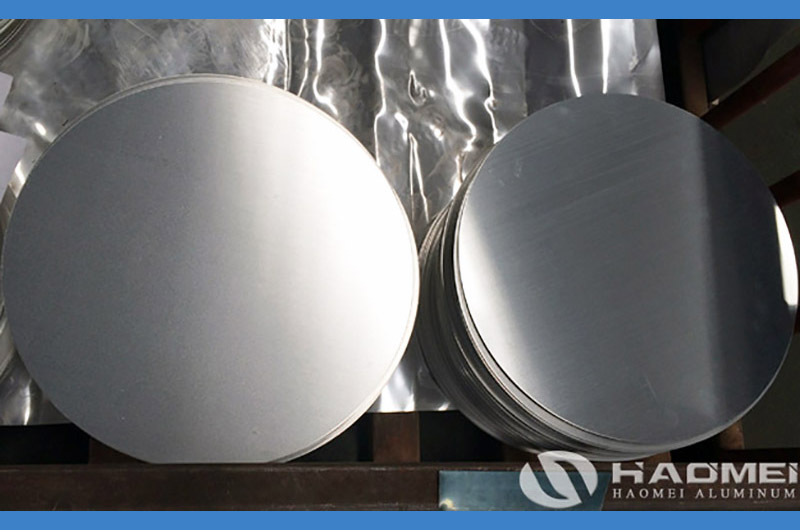Aluminum Stamping Discs
Aluminum stamping discs are suitable for efficient, large-scale production and can produce relatively simple parts, but they have certain limitations in terms of material thickness and complexity.
Aluminum stamping discs are flat, circular aluminum pieces formed through the stamping process. These discs are used in a variety of applications due to their versatility, light weight, and ease of manufacturing.
Aluminum stamping discs are suitable for efficient, large-scale production and can produce relatively simple parts, but they have certain limitations in terms of material thickness and complexity.

The Specification of Aluminum Stamping Discs
- Series: 1050, 1060, 1070, 1100, 3003, 5052
- Temper: O, H12, H14, H16, H18
- Thickness: 0.2-10.0 mm
- Diameter: 20-1200 mm
- Applications: Lampshades, cookware, kitchen utensils
- Size and Shape: Available in various diameters and thicknesses, and customizable to meet specific requirements.
- Surface Treatment: Options like anodizing, painting, or coating can be used to enhance the disc’s performance.
- Aluminum stamping discs strike a balance between strength, weight, and versatility, making them suitable for a wide range of industrial and consumer applications.
Aluminum Stamping Disc Alloy Materials
Material: Usually made from high-quality aluminum alloy.
Common Alloys: 1050 and 3003 are often used, depending on the required strength, corrosion resistance, and specific application.
Aluminum Circle Disc Stamping Process
Stamping: The discs are produced through a stamping process, which involves pressing a flat piece of aluminum into a die to form a circular shape. This process can produce discs with precise dimensions and smooth surfaces.
Thickness: The thickness of the stamped discs ranges from very thin to thicker gauges, depending on the application and requirements.
Aluminum Stamping Disc Applications
- Cookware: Used in the production of pots, pans, and other kitchen utensils because they can evenly distribute heat.
- Lighting Fixtures: Used in components like reflectors and lampshades, benefiting from their reflective properties and ease of forming.
- Automotive Parts: Used in various automotive components due to their light weight and high strength.
- Industrial Parts: Used as covers, bases, and other functional parts for machinery and equipment due to their durability and ease of processing.
How Much Force Does It Take to Stamp Aluminum?
The force required to stamp aluminum depends on several factors, including the thickness of the aluminum, the complexity of the shape being formed, the design of the die, and the capacity of the stamping machine.
- Aluminum Thickness: Thicker aluminum sheets require greater stamping force. The greater the thickness, the higher the pressure required.
- Aluminum Type: Different types of aluminum alloys have varying strengths and plasticity, so the stamping pressure required will also differ.
- Die Design: The complexity of the die design will also affect the stamping force. If the die design is complex or involves multiple steps, more pressure may be needed.
- Stamping Process: Different stamping processes (such as single-step stamping, progressive stamping, etc.) will also influence the required force.
What is the difference between casting and stamping aluminum?
| Category | Cast Aluminum | Stamped Aluminum |
| Manufacturing Process | Aluminum is melted and poured into molds for shaping. Common methods include sand casting, die casting, gravity casting, etc. | Aluminum sheets are shaped using mechanical stamping or die cutting, suitable for thin-walled and simple-shaped products. |
| Material Properties | Has a relatively coarse grain structure with lower strength but can be used to make parts with complex shapes. | Features a finer grain structure and higher strength, with good ductility, suitable for products requiring high precision and strength. |
| Applications | Suitable for making complex and durable parts, such as engine components, mechanical parts, tool housings, etc. | Ideal for producing large quantities of precise thin sheet products, such as automotive body panels, kitchen utensils, and electronic housings. |
| Surface Treatment | The surface is relatively rough and often requires further processing or treatment, such as polishing or coating. | The surface is relatively smooth and usually requires little surface treatment unless to enhance appearance or corrosion resistance. |
| Production Cost | The initial mold cost is relatively high, but small batches and complex-shaped parts can be manufactured more economically. | Suitable for large-scale production. After mold costs are amortized, the unit cost becomes relatively low. |
What Grade Aluminum for Stamping?
- 3003 Aluminum Alloy: This is a commonly used aluminum alloy with good formability and excellent corrosion resistance, suitable for various stamping applications such as food packaging, appliance components, etc.
- 1100 Aluminum Alloy: This alloy is mainly used for applications requiring high ductility and good formability, making it ideal for lightweight stamped parts.
- 5052 Aluminum Alloy: Known for its excellent corrosion resistance and strength, it is used for stamped parts that require higher strength and corrosion resistance, such as automotive and marine components.
